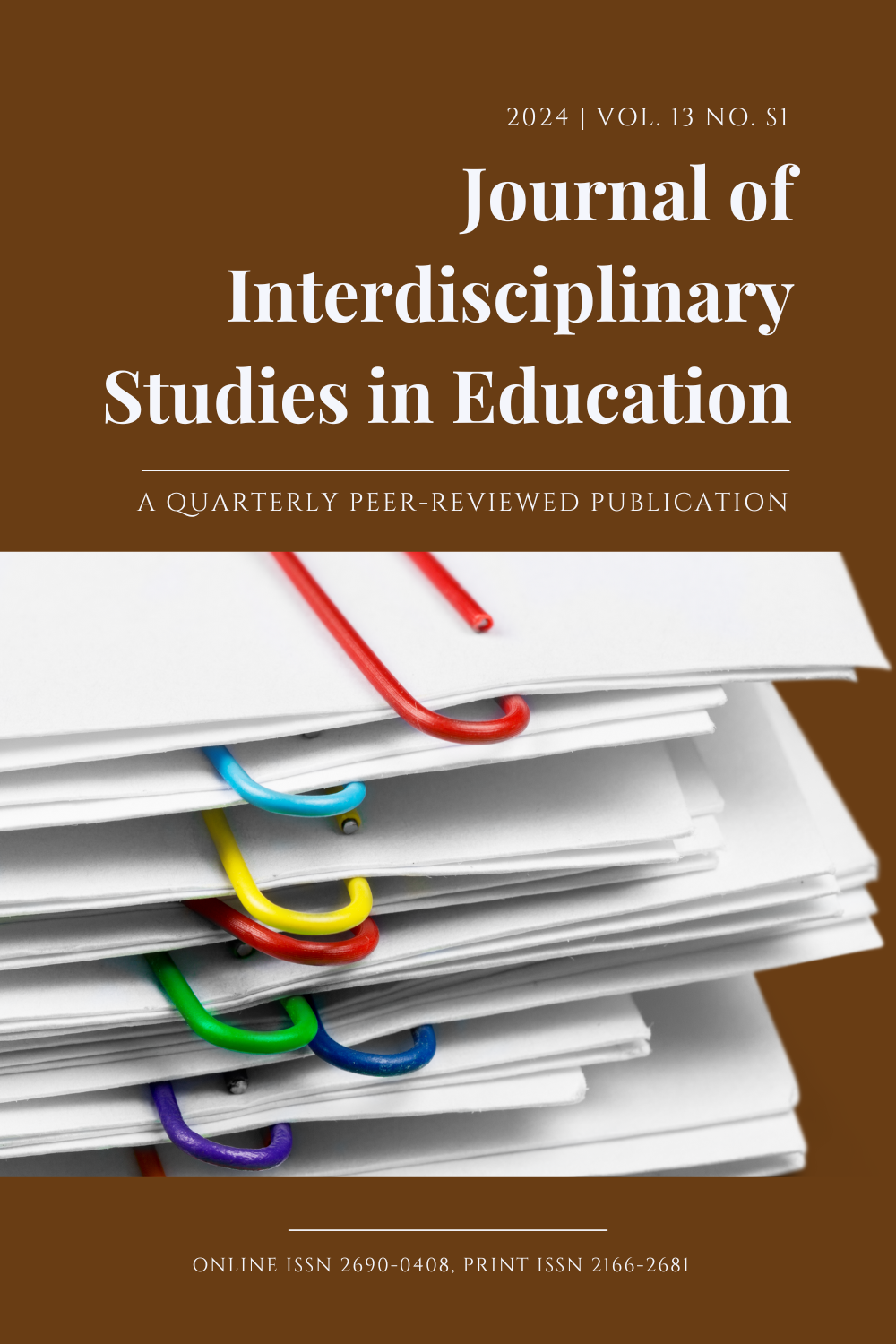Impact of digital modules on math achievement by gender and locality
DOI:
https://doi.org/10.32674/7eh5nh63Keywords:
Achievement, e-content, effectiveness of e-content, e-learning, digital modulesAbstract
Digital modules typically refer to self-contained units of online learning materials designed for specific topics or learning objectives. The researcher developed digital modules for three specific math units and conducted a three-week experiment in six schools in three districts of Punjab. The purpose of the study was to find the effectiveness of digital modules. The study revealed a statistically significant difference in gain achievement scores and posttest achievement between the experimental and control groups. The t statistic for gain achievement scores was 2.41, indicating a p-value of 0.016, and 2.70 for posttest achievement. This suggests a significant difference in learning outcomes between the two groups.
Downloads
References
Adeniyi, I.S, Hamad, N.M.A., Adewusi, O.E., Unachukwu, C.C., Osawaru, B. Chilson, O.U, Omolawal, S.A., Aliu, A.U. & David, I.O. (2024). Reviewing online learning effectiveness during the COVID-19 pandemic: A global perspective. International Journal of Science and Research Archive, 11(1), 1676–1685. https://doi.org/10.30574/ijsra.2024.11.1.0282
Astuti, B., Purwanta, E., Lestari, R., Bhakti, C. P., Anggela, E., & Herwin, H. (2022). The effectiveness of digital modules to improve career planning of junior high school students. World Journal on Educational Tmodulesogy: Current Issues, 14(3), 940–950. https://doi.org/10.18844/wjet.v14i3.7396
Awadh A.Y.,Qahtani, S. E. H. (2013). Effects of traditional, blended and e-learning on students’ achievement in higher education. Journal of Computer Assisted Learning, 29(3), 220–23https://doi.org/10.1111/j.1365-2729.2012.00490.x
Azhari, F. A., & Ming, L. C. (2015). Review of e-learning Practice at the Tertiary Education level in Malaysia. Indian Journal of Pharmaceutical Education and Research, 49(4), 248–257. https://doi.org/10.5530/ijper.49.4.2
Aziz, R. C., Hashim, N. A. A. N., Omar, R. N. R., Yusoff, A. M., Muhammad, N. H., Simpong, D. B., Abdullah, T., Zainuddin, S. A., & Safri, F. H. M. (2019). Teaching and learning in higher education: E-learning as a tool. International Journal of Innovative Technology and Exploring Engineering, 9(1), 458–463.https://doi.org/10.35940/ijitee.A4188.119119
Bidaki, M. Z., Sanati, A. R., & Ghannad, F. R. (2013). Producing and introducing mobile books, as a new model of providing learning content in medical sciences. 2nd World Conference On Educational Technology Research, (83), 99–102. https://doi.org/10.1016/j.sbspro.2013.06.019
Calvadores, C. (2022). A Standardized Achievement Test in Mathematics for Grade 8 Students in the Schools Division of Eastern Samar. Ejlss.Indexedresearch.Org, (15), 15–20. http://ejlss.indexedresearch.org/index.php/ejlss/article/view/482
Debevc, P. M. (2000). Usability testing of e-learning content as used in two learning management systems. 1–8.
Eremias, L., & Subash, R. (2013). E-Content Development: A milestone in the dynamic progress of E-Learning. International Journal of Teacher Educational Research, 2(1), 43–49.
Hamadi, M., & El-Den, J. (2024). A conceptual research framework for sustainable digital learning in higher education. Research and Practice in Technology Enhanced Learning, 19(1), 1–25. https://doi.org/10.58459/rptel.2024.19001
Jayanthi, J. (2014). Development and validation of an achievement test in mathematics. Ijmsi.Org, (2), 40–46. https://www.ijmsi.org/Papers
James, J., & Talin, R, S. B. (2013). Defining student’s achievement based on the understanding of national education philosophy and Malaysia’s education blueprint. Msocialsciences.Com, (2013-2025). https://doi.org/10.47405/mjssh.v7i4.1401
Juhary, J. (2010). The challenges in developing e-content. International Journal of Emerging Technologies in Learning, 5(2), 52–56. https://doi.org/10.3991/ijet.v5s3.1505
Kapoor, J., Kaur, I., & Kaur, G. (2023). Artificial intelligence technology-embedded learning: Rethinking pedagogy for digital Age. Proceedings of the 2nd International Conference on Applied Artificial Intelligence and Computing, 87–93 https://doi.org/10.1109/ICAAIC56838.2023.10140614
Kaur, I., Jyoti, & Aggarwal, V. (2020a). Development of E-content: “no longer a critical step.” International Journal of Advanced Science and Technology, 29(8), 981–990.http://sersc.org/journals/index.php/IJAST/article/view/10954
Kaur, I., Jyoti, & Raskirat. (2020). Perspectives of E-Content: a Systematic Review. International Journal of Advanced Science and Technology, 29(6 s), 2698–2715. http://sersc.org/journals/index.php/IJAST/article/view/12187
Komalavalli, S., & Amsayal, C. (2022). Effectiveness of multimedia E-Content module in enhancing achievement in English among standard IX boys. Journal of Positive School Psychology, 6(6), 185–189. http://journalppw.com
Muruganantham, G. (2015). Developing of E-content package by using the ADDIE model. International Journal of Applied Research, 1(3), 52–54. http://www.allresearchjournal.com/vol1issue3/PartB/pdf/67.1.pdf
Meysun Hamdi, & Thair Hamtini. (2016). Designing an effective e-content development framework for the enhancement of learning programming. International Journal of Emerging Technologies in Learning, 11(4), 131–141. https://doi.org/10.3991/ijet.v11i04.5574
Pio Albina, A. (2018). Effectiveness of E-content in teaching of mathematics education among B.Ed. student-teachers. American Journal of Educational Research, 6(7), 1021–1028. https://doi.org/10.12691/education-6-7-20
Starkey, L., & Zhong, J. (2019). The effect of netbook ownership on children’s academic achievement in mathematics, reading, and writing. Journal of Computer Assisted Learning, 35(1), 34–41. https://doi.org/10.1111/jcal.12308
Tekin, A., & Polat, E. (2016). A Scale for E-Content Preparation Skills: Development, Validity and Reliability. Eurasian Journal of Educational Research, 16(62), 143–160. https://doi.org/10.14689/ejer.2016.62.9
Trakru, M., & Kumar Jha, T. (2019). E-Learning Effectiveness in Higher Education E-Learning Effectiveness in Higher Education. International Research Journal of Engineering and Technology, 6(5). www.irjet.net
Xiu‑Yi Wu. (2024) Exploring the effects of digital technology on deep learning: a meta‑analysis. Education and Information Technologies, 29(1),425-458 https://doi.org/10.1007/s10639-023-12307-1
Zhussupbayev, S., Nurgaliyeva, S., Shayakhmet, N., Otepova, G., Karimova, A., Matayev, B., & Bak, H. (2023). The effect of using computer-assisted instruction method in history lessons on students’ success and attitudes. International Journal of Education in Mathematics, Science and Technology, 11(2), 424–439. https://doi.org/10.46328/ijemst.3136
Additional Files
Published
Issue
Section
License
Copyright (c) 2024 Jyoti Kapoor, Guneet Kaur Cheema

This work is licensed under a Creative Commons Attribution-NonCommercial-NoDerivatives 4.0 International License.







